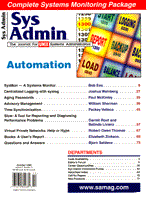
Sidebar : TerminologyTime Reference - The source of a system's time (e.g. UTC delivered by GPS, cesium clock, radio clock). Accuracy - How well a clock's time and frequency compare to a reference. Resolution - The precision that can be maintained. Offset - The difference in time between two clocks. Synchronization - Two clocks with zero offset. Skew - The difference in frequency between two clocks. Drift - The difference in skew between two clocks. UT C - (Coordinated Universal Time): Time at 0 meridian (Greenwich, UK) based on atomic oscillator. Step a clock - Instantaneously change the offset to zero. Slew a clock - Gradually (about 0.01%) change the offset to zero. Monotonicity - A clock that always increments in the same direction (i.e., not both backward and forward). Frequency Synchronization - To set two oscillators to run at the same frequency. Time Synchronization - To set two clocks so they agree with respect to UTC. Clock Synchronization - To set two clocks to they agree with respect to frequency and time. Time Code Generator - A device capable of encoding the current time as represented in the device and making it available for distribution. TCG have very accurate internal oscillators for use in stand-alone mode, and are also capable of synchronizing to an externally supplied oscillator (such as a cesium standard) for even better accuracy. Time Code Processor - A device residing on the peripheral bus of a computer that is capable of receiving an encoded time signal, decoding it, and making it available to an application program. Typical implementations include standard buses such as PCI and VME and proprietary buses such as Sbus (Sun) and Qbus (DEC). Propagation Delay - The time an electrical signal takes to move from one point to another. This number is fairly low, on the order of 1.0 nanosecond per foot, and usually easy to determine in advance. Therefore, it is straightforward to compensate for propagation delay by ADDING it to the time presented by the system. Often, time code processing hardware will provide compensation for propagation delay.
Processing Latency - For a time code processor board residing on a computer peripheral bus, the period from when the time is requested to when the time is available to the application program. Often these boards are read once to latch the current time, then read again to transfer the time to the application. The read latch is typically a few microseconds, and the subsequent data transfer on the order of 300 ms. You can characterize a system so that the processing latency can be compensated for, or at least reduced.
|